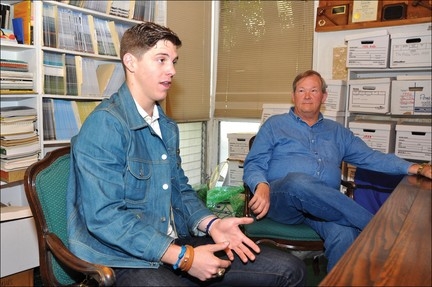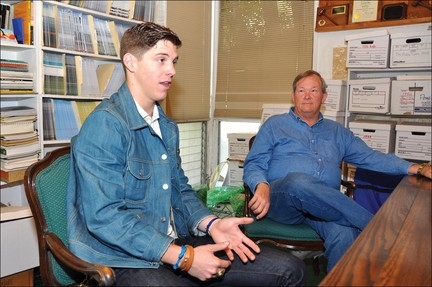MALIBU — Fallen angels are what Marines call those who do not return from battle.
"The last full measure of devotion" is how Lincoln put it. It's also the dread of every family with a son or daughter on the battlefield.
For the Malibu families of Marines Robert Jennings Spangle and Nathan Ball, who each recently returned safely after two tours of duty in Afghanistan, the uncertainty of war was never more fully realized than when they learned their sons were being sent into the heart of the conflict.
The occasional e-mails and phone calls home often didn't allay their fears. As Mark Ball, Nathan's father, recalled: "It's just day-to-day terror."
The two Malibu High School grads both enlisted in the Marines after finishing school — Spangle was one year ahead of Ball — and, although they wound up training in different branches of the Marines, their wartime experiences took very similar paths. Ball was recruited into the specialized Marine Expeditionary Force, which was responsible for reconnaissance, while Spangle joined the infantry. Yet both young men found themselves in Helmand Province — the eye of the storm in the war against the Taliban — for both of their seven-month deployments. In fact, for nearly two full years one or the other was there.
"That's where we centralized our focus on rooting out the Taliban," Ball, 21, said.
And there was another similarity — they each had their share of close calls.
Second Cpl. Spangle, 22, was in a town called Nawzad, the same town Ball would find himself in less than a year later, doing recon. "It was like a mud and brick Stalingrad," Spangle said.
While checking out a rooftop, he suddenly felt "like someone was breaking my ribs." He'd been shot in the side by a sniper from more than 200 meters away.
"He (the sniper) definitely knew what he was doing," Spangle said, whose body armor protected him. "I had a good reaction, I just tucked and rolled. There was a hole near where I was standing and I just ducked into that. I was out there (on patrol) for three days so I didn't have time to check myself out. I was like, ‘I'm not bleeding, that's good.'"
Lance Cpl. Ball, meanwhile, had a startling introduction to the war on his very first patrol riding a military vehicle. An IED, or improvised explosive device, planted along the road his truck was traveling exploded, blowing up the front end of the truck.
"The guy driving the truck was saying this area's been quiet and this should be easy for you guys. Then 15 seconds later, boom! All I remember was seeing blackness and stars. It took me a couple of minutes to realize where I was," Ball said. "You train for everything, but it wasn't what I expected just starting out. But it was good that it happened because I really knew I was in (the war) now."
Despite the constant danger of firefights, snipers and mortars — "I had tons of close calls," said Spangle — both men agree it was the IEDs that posed the greatest threat to their safety.
"They (Taliban) can literally put them anywhere," said Spangle. "Plastic bottles, tubes, even tree trunks. In the walls. And they come in a bunch of terrible flavors. It was a daily threat."
Both men had breaks stateside before their second deployments and, strangely enough, both men were anxious to get back.
"Being back in the States, knowing you're going to have to go back, you just want to get it over with as soon as possible," Ball said. Unfortunately for Ball, his second deployment was as difficult and unpleasant as the first. "I got there in the summer (of 2011), when the Taliban really picks up the offensive. It got pretty bad over the summer.
"The biggest issue for us was figuring out who were civilians and who were Taliban."
He also discovered that one of the areas his battalion had fought so hard to secure his first time there had been retaken by the Taliban.
Spangle, however, noticed a definite change between his two deployments, especially in the quality of life for the locals, although clashes with the Taliban were just as frequent as before.
"Our success and failure is defined by how the population reacts to our presence," he said. "I actually got to see the progress being made. In areas that had been unattainable to us, there were roads, schools, gas stations, a radio station. When I first got there, there was one paved road in the whole country. Now, there are 26 paved roads."
"It's something, I think, that is very hard for most Americans to appreciate, not being there and the way some of it is reported. There definitely was progress."
After two deployments, both men returned home to their families. And safety.
"Some things come back and bother you," said Spangle, who saw more than his share of fallen angels, as did Ball. "But that's not strange. Love them or hate them, the guys you work with are your best friends. It's a lot closer than most American families in many ways. It can be traumatizing, but that's what we trained for."
As for the future, both men are on "inactive reserve" for a few years before their commitment to the Marines and the country is completed. In the meantime, they're going to do what most high school graduates do — go to college.
"I have a month left to finish my commitment (to the Marine Corps)," said Ball. "Then I'm going to go to Moorpark (College) in the fall." He plans to follow in his father's footsteps in the insurance business.
Spangle is already attending Otis College of Art and Design, where he plans to follow a career in fashion design.
As grueling and dangerous as their time in Afghanistan was, neither man has any regrets.
"There were a billion reasons why (I enlisted)" said Spangle. "I probably wouldn't have joined if Sept. 11 hadn't happened. That was the jumping off point. I felt like it was my civic duty to do something about it."
This article first appeared in the Malibu Times.╌









